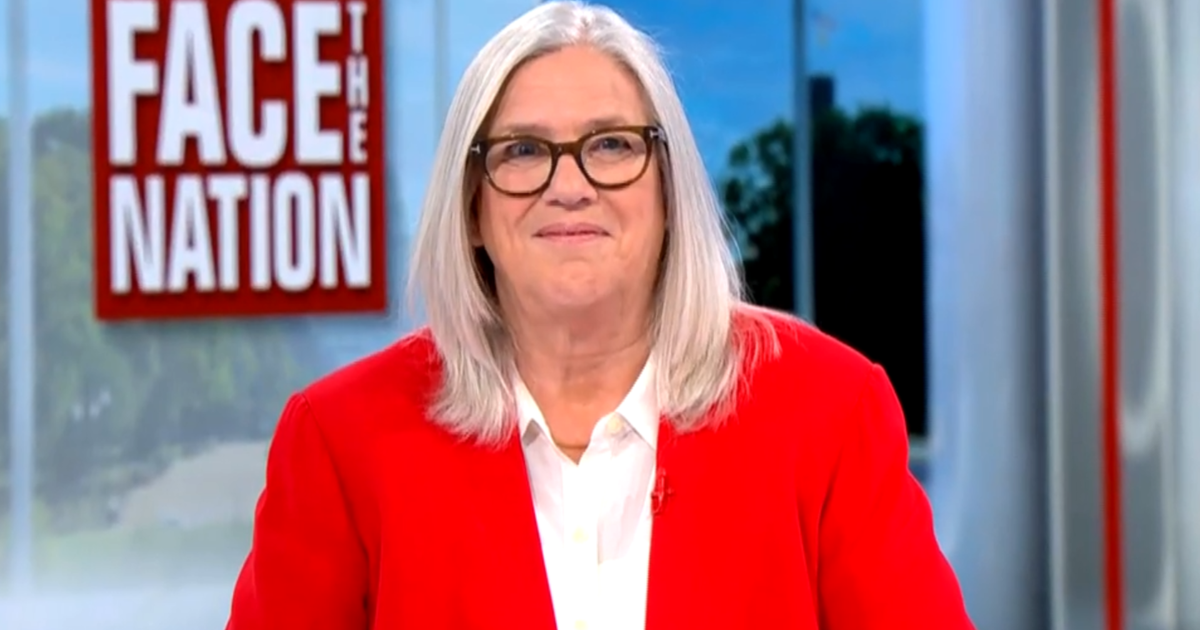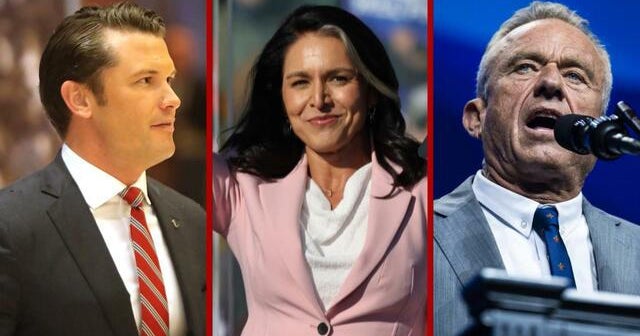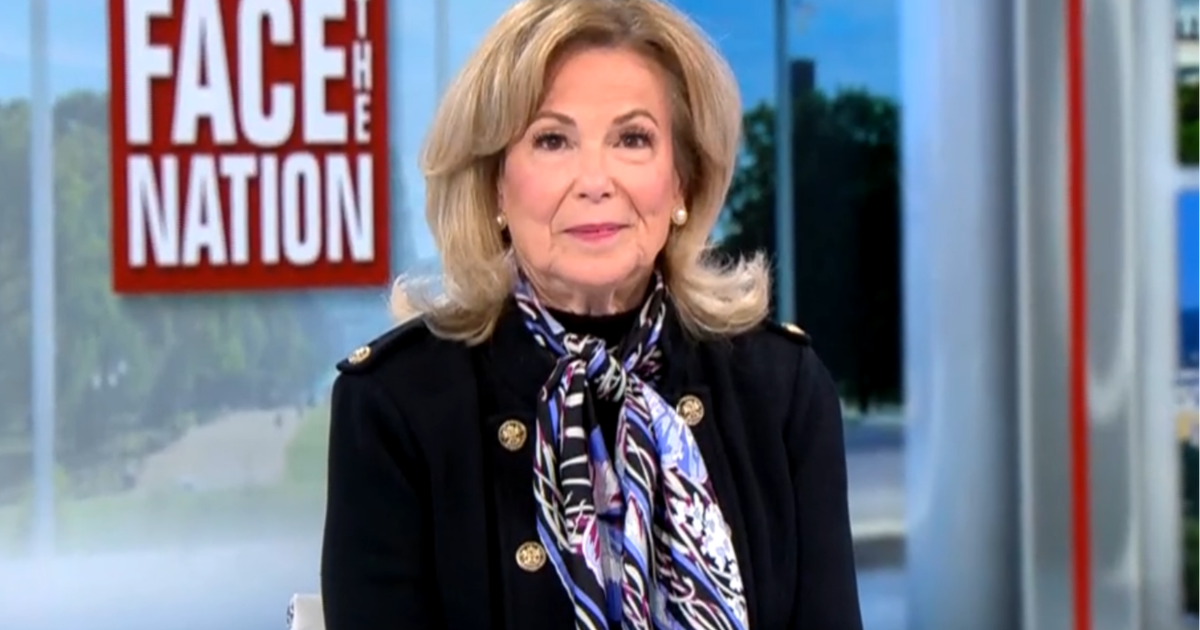CBS News
Transcript: Sue Gordon on “Face the Nation with Margaret Brennan,” Nov. 17, 2024

The following is a transcript of an interview with Sue Gordon, principal deputy director of National Intelligence in the first Trump administration, on “Face the Nation with Margaret Brennan” that aired on Nov. 17, 2024.
MARGARET BRENNAN: We’re joined now by Sue Gordon. She served as the Principal Deputy Director of National Intelligence during Donald Trump’s first term in the White House. Good to see you here again.
SUE GORDON: Great to see you, Margaret.
MARGARET BRENNAN: So you personally briefed Donald Trump as President in the Oval Office. If this nominee to be Tulsi Gabbard becomes the Director of National Intelligence, and John Ratcliffe becomes the CIA director, are you confident that Mr. Trump will be told the information he needs to know, and not just what he wants to know?
SUE GORDON: Well, I think that’s the- I think that’s the question of the day. Intelligence is weird
because it’s always uncertain, and you are always making an assessment so that a decision-maker can figure out what they’re going to do with it. And so it’s particular. And you- your only job is to ruthlessly report what you see, not what you prefer. So that’s the primary job of the DNI, is to go in there and to be his principal advisor on intelligence. You’re the first in, you’re the last out. You cannot afford to, I’ll say pander to preference. Loyalty doesn’t serve you well in that job. You have to be so committed that you will say inconvenient things. I will say the former president would tell you that I would talk to him about Russian interference. I know he hated it, but Russia was in fact interfering, and he needed to hear that information. So do I believe that Tulsi and John can be that person? If they believe they must be, they can learn. If they lean on the women and men of the intelligence community, they will produce an assessment. But that’s a hard day, and you better be good at it.
MARGARET BRENNAN: You had to undergo an FBI background check to obtain a security clearance and to maintain it. You were a career official, 25 years at the CIA, then, as we said, moved on to national intelligence. The New York Times is reporting the Trump team may bypass the FBI process and just use a private firm to vet candidates. Then, when the president is sworn in, he can grant access to the nation’s secrets rather than go through that screening. What risk is there in bypassing the FBI?
SUE GORDON: Well, the first risk is that you will get an incomplete picture of the human that is carrying both the trust of the American people and the trust of our allies and partners and the trust of the women and men that are putting their lives on the line for that judgment, right? Everyone hates vetting. It’s intrusive. It- you don’t know why anyone should have to do it, because you know who you are. But the truth is, we know adversaries and competitors will exploit humans to be able to advance their interests, and you want to make sure that the people that hold the American people’s trust and the most precious pieces of information we have of advantage, have no cracks in who they are. And so it seems expedient, but I think it will ultimately harm the institution. And by that I mean the institution of America, if you have people who we discover later that they should not have had access, or we discover later that they were vulnerable to the actions of our allies and of our adversaries and competitors–
MARGARET BRENNAN: –Because of leverage on them–
SUE GORDON: — It is, I mean, that’s, I mean, the craft of human intelligence is actually finding someone who has a weakness and getting them to be able to advance your interests, and it just- and what a really good day is when you find someone whose interests align with yours, and then you really push that. So a private firm isn’t going to have the standards that we’ve had. I know it’s inconvenient, but I think it’s a bad strategy and risky for America.
MARGARET BRENNAN: So CBS has also learned that, to date, the Trump team hasn’t signed the paperwork that would start the process of the national security briefings, so that someone’s not walking in cold they’re briefed and up to speed, along with these background checks. The Partnership for Public Service, a nonpartisan group that helps with the transitions, confirmed that to CBS. Is there any good reason not to sign those papers, and what does it do for the officials who arrive without being read in on what’s happening now?
SUE GORDON: Yeah, I can’t think of a- I can’t think of a good reason. I think one of the great falsehoods that’s been perpetrated on America is that our institutions are malfeasant. They need to be better, they need to be slimmer, they need to be more transparent, but they’re not bummed. So you’re not protecting anybody by not signing those papers, and especially with some of the nominees we have that don’t have the really deep experience base, these are big jobs. I mean, intelligence is not just advising the president, it’s also running a huge enterprise in a manner that allows our allies and partners to trust us with their most precious thing. So I can’t think of a reason why that’s not signed- signed, and to start your gig without any foundation at all, especially when the institutions are begging to give you that foundation just seems wrong-headed.
MARGARET BRENNAN: You’re diplomatically referring to Tulsi Gabbard there, who doesn’t have a background in intelligence. She also has a history of statements, of saying things that mirror the rhetoric of us adversaries, Vladimir Putin and Bashar al-Assad. There were at least two chemical weapons attacks in Syria that killed thousands of people, and the US intelligence community came to public assessments of high confidence. I imagine you saw all of that intelligence and you briefed on it.
SUE GORDON: Yes.
MARGARET BRENNAN: So when she comes out and says that she doubts it. She’s skeptical. How is that going to be received by the career professionals who work for her?
SUE GORDON: Yeah I mentioned one of her jobs would be to be the senior advisor. The second is to be responsible for all intelligence sharing agreements so our allies and partners upon whom we rely, that Syria assessment, that was joint with our allies and partners. The one we had on Skripal was joint. Our assessment of Ukraine was joint–
MARGARET BRENNAN: –That was sorry, just to explain for our viewers, Skripal, you’re talking about the killing on British soil of a former Russian by Russian intelligence.
SUE GORDON: But all those were jointly done with our allies and partners. We need them. It’s one of the greatest strengths of America, but they will make their own assessment over whether we can be trusted with their nation’s interests, and whether she meant it or not, whether she was just ill-informed of that, she comes in with strikes against her in the trust perspective, can we trust her with our most sacred intelligence to represent that in a fair way. So I think it’s a problem, whether it’s judgment or any other thing that she has represented there.
MARGARET BRENNAN: Another nerve in the intelligence community, of course, is Edward Snowden. Tulsi Gabbard, and the selection for the attorney general, Matt Gaetz, put forward resolutions to call for the charges to be dropped against him because he leaked classified national intelligence material. He’s living in Russia these days. That kind of a position, how’s that going to be received?
SUE GORDON: It reflects a lack of understanding of who we are, and it reflects a lack of respect for what we do. Unauthorized disclosures of intelligence are always bad. Don’t go with the good or bad, any good outcome or whether he was right or wrong. He had no authority, and he had different paths, and he harmed America. He not only harmed intelligence, he harmed our allies and partners, and he harmed our businesses by what it allowed China to assume about that. there is nothing justifiable about what he’s done. None. And so if they vacate it, what they’re basically saying is all those rules you follow in order to be able to serve America, they don’t matter anymore.
MARGARET BRENNAN: Sue Gordon, thank you for explaining this very opaque world of intelligence to us and for your analysis today. We’ll be back in a moment.
CBS News
Organic carrots recalled after E. coli outbreak. These are the brands and grocery stores impacted.

A massive recall of organic carrots and baby carrots sold at grocery stores across the country was issued by a California grower after a possible outbreak of E. coli that has already killed one person.
Grimmway Farms, which made and packaged the organic carrots, issued the recall on Saturday after nearly 40 cases were recorded in 18 states. At least 15 people were hospitalized and one person has died, the Centers for Disease Control and Prevention said.
Where were the carrots sold?
A number of stores that sold the carrots across the United States, including Puerto Rico, and Canada are impacted, including Walmart, Kroger, Albertsons, Publix, Food Lion, Target, Whole Foods, Trader Joe’s and Canadian chains Loblaws and Compliments.
“State and local public health officials are interviewing people about the foods they ate in the week before they got sick,” the U.S. Food and Drug Administration said Sunday. “Of the 27 people interviewed, 26 reported eating carrots. The FDA’s traceback investigation identified Grimmway Farms as the common supplier of organic whole and baby carrots in this outbreak.”
What carrots have been recalled?
According to the FDA, the recall did not pull any carrots off the shelves at stores as they should no longer be available for sale, however, they may still be in people’s homes and refrigerators.
Organic whole carrots, which do not have a best-if-used-by date printed on the bag but were available for purchase at retail stores from Aug. 14 through Oct. 23, 2024.
Organic baby carrots with best-if-used-by-dates ranging from Sept. 11 through Nov. 12, 2024.
What brands of carrots have been recalled?
These lists include the brands or store’s brands (and bag size) that sold the carrots.
Organic Whole Organic Carrots
Whole Foods 365 – 1lb, 2lb, 5lb
Grimmway Farms
Bunny Luv – 1lb, 2lb, 5lb, 10lb, 25lb
Cal-Organic – 1lb, 2lb, 5lb, 6lb, 10lb, 25lb
Compliments – 2lb
Full Circle – 1lb, 2lb, 5lb
Good & Gather – 2lb
GreenWise – 1lb, 25lbs
Marketside – 2lb
Nature’s Promise – 1lb, 5lb
O-Organics – 1lb, 2lb, 5lb, 10lb
Grimmway Farms
President’s Choice – 2lb
Simple Truth – 1lb, 2lb, 5lb
Trader Joe’s – 1lb
Wegmans – 1lb, 2lb, 5lb
Wholesome Pantry -1lb, 2lb, 5lb
Organic Baby carrots
Whole Foods 365 – 12oz, 1lb, 2lb
Grimmway Farms
Bunny Luv – 1lb, 2lb, 3lb, 5lb
Cal-Organic – 12oz, 1lb, 2lb, 2pk/2lbs
Compliments – 1lb
Full Circle – 1lb
Good & Gather – 12oz, 1lb
Grimmway Farms
GreenWise – 1lb
Grimmway Farms – 25 lb
Marketside – 12oz, 1lb, 2lb
Nature’s Promise – 1lb
O-Organics – 12oz, 1lb, 2lb
President’s Choice – 1lb, 2lb
Raley’s – 1lb
Simple Truth – 1lb, 2lb
Sprouts – 1lb, 2lb
Trader Joe’s – 1lb
Wegmans – 12oz, 1lb, 2lb
Wholesome Pantry – 1lb, 2lb
What kind of E. coli might be associated with the outbreak?
According to the CDC, the carrots might be linked to an outbreak of E. coli O121:H19, which could cause severe stomach cramps, diarrhea (often bloody), and vomiting. Symptoms usually start three to four days after swallowing the bacteria and most people recover without treatment after five to seven days.
Some people may develop serious kidney problems and would need to be hospitalized, the CDC said.
Already 39 people have been infected across 18 states including Washington, Minnesota, New York, California, Oregon, South Carolina, New Jersey, Texas, North Carolina, Missouri, Pennsylvania, Arkansas, Colorado, Massachusetts, Michigan, Orion, Virginia and Wyoming.
What should you do if you have the carrots?
The CDC and FDA say that any recalled carrots should be thrown away immediately or returned to the store for a refund. People should also clean and sanitize any surface they may have touched.
CBS News
Trump’s controversial Cabinet and senior staff picks face uncertain future in Washington

Washington — President-elect Donald Trump’s Cabinet and senior staff picks are facing an uncertain future as his selections received mixed reviews in recent days even from fellow Republicans — and a handful sent shockwaves through Washington.
Trump’s selection for attorney general in former Rep. Matt Gaetz, a GOP firebrand who was under investigation by the House Ethics Committee for allegations of sexual misconduct and obstruction, has drawn criticism from both sides of the aisle. And Trump’s pick for defense secretary in Pete Hegseth, an Army combat veteran and former Fox News anchor, has also sparked concerns, especially as an investigation into sexual assault allegations against him has been made public. Additionally, former Democratic Rep. Tulsi Gabbard, Trump’s pick for director of national intelligence, doesn’t have a background in intelligence and has drawn criticism for her views on Russia and other U.S. adversaries.
Appearing on “Face the Nation with Margaret Brennan” on Sunday, Democratic Rep. Jim Himes of Connecticut expressed astonishment about those questioning whether experience is necessary when asked about Gabbard, saying “of course it’s necessary.”
“These people are manifestly unqualified, and you know, they’re not prepared to run the very complicated organizations they’ve been asked to run,” Himes said.
But Himes, the ranking Democrat on the the House Intelligence Committee, said that Gaetz’s qualifications should also examined as well as the unreleased House Ethics Committee report.
“How is it that this is what we’re focusing on?” Himes said. “Matt Gaetz is, by any standard, completely unqualified to be the Attorney General, and yet we’re sort of focused on this, you know, cherry on the cupcake of the Ethics report.”
Gaetz’ resignation from Congress after Trump’s announcement came days ahead of a planned meeting and vote by the House Ethics Committee on whether to release a report on its investigation into Gaetz. Speaker Mike Johnson said Friday that he would “strongly request” that committee withhold the potentially damaging report.
Rep. French Hill, an Arkansas Republican who also appeared on “Face the Nation” on Sunday, said Johnson makes “an important point,” warning that “we don’t want to set a precedent where we, under any circumstances, will release documents from that committee.” But he stressed that the decision is the committee’s alone, while noting that on Trump’s selections, the Senate will exercise its advise and consent role through the confirmation process.
“President Trump has the prerogative to nominate the people that he thinks can best lead the change that he believes the American people are seeking in each of the agencies of the federal government,” Hill said.
The Arkansas Republican outlined that when Trump came to office in 2017, there were members of his Cabinet who he had no personal relationship with or working background.
“He wants to correct that this time by finding people that he has a good working relationship with. He knows how they think, they know how he thinks, because he thinks it will lead to better decision making in his administration,” Hill said.
For his part, Himes offered some praise to some of Trump’s other picks.
“I actually had a really good day when Marco Rubio was nominated for Secretary of State, when John Ratcliffe was nominated for CIA and when Mike Waltz was nominated to be national security adviser,” Ratcliffe said. “Those are good nominations, not necessarily the nominations I would have made if I were president, but these are serious people with real experience.”
Still, he cautioned Republicans in the Senate as the confirmation process plays out, saying that he understands “what happens to Republicans who stand up to Donald Trump,” but “history is a harsh judge.”
“The Republican senator who votes to confirm Matt Gaetz or Robert Kennedy or Tulsi Gabbard will be remembered by history as somebody who completely gave up their responsibility to Donald Trump,” Himes said.
Sue Gordon, who served as principal deputy director of national intelligence under Trump and also appeared on “Face the Nation” on Sunday, stressed that vetting will be critical to the process moving forward, amid a New York Times report that Trump’s team may bypass the typical FBI procedure and instead opt to use a private firm to vet his nominees who would be granted security clearances.
“It seems expedient, but I think it will ultimately harm the institution,” Gordon said, noting that a private firm won’t have the same standards. “I know it’s inconvenient, but I think it’s a bad strategy and risky for America.”
Meanwhile, the Partnership for Public Service, a nonpartisan group that assists with presidential transitions, confirmed to CBS News that the Trump team hasn’t signed paperwork that allows for security clearances and background checks, among other things, to occur. Gordon said she can’t think of a “good reason” for the Trump team to forego the transition paperwork, saying that “one of the great falsehoods that’s been perpetrated on America is that our institutions are malfeasant.”
“You’re not protecting anybody by not signing those papers, and especially some of the nominees we have that don’t have the really deep experience base,” Gordon said. “To start your gig without any foundation at all, especially when the institutions are begging to give you that foundation, just seems wrong-headed.”
CBS News
Dr. Deborah Birx says she is “excited” for data-driven discussions in RFK Jr.’s confirmation hearings

Dr. Deborah Birx, former White House Coronavirus response coordinator, said Sunday she is “excited” for the data on key health issues that will surface in Senate confirmation hearings for Robert F. Kennedy, Jr., President-elect Donald Trump’s controversial pick for Health and Human secretary who has spread false information on vaccines and autism.
“I’m actually excited that in a Senate hearing he would bring forward his data and the questions that come from the senators would bring forth their data,” Birx said on “Face the Nation with Margaret Brennan.” “What I know for sure is he’s a very smart man who can bring his data and his evidence base forward, and we can have a discussion that many Americans believe already is a problem.”
President-elect Donald Trump announced Thursday in a social media post that he’ll nominate Kennedy to oversee the Health and Human Services Department, which encompasses multiple agencies and has a $1 trillion budget. The position has to be approved by the Senate, which, come January, will be controlled by Republicans, which could make the nomination process easier but is not a guarantee.
“I am thrilled to announce Robert F. Kennedy Jr. as The United States Secretary of Health and Human Services (HHS),” Trump wrote in a social media post last week. He said Americans have been “crushed by the industrial food complex and drug companies who have engaged in deception, misinformation, and disinformation” about public health, and Kennedy would “Make America Great and Healthy Again!”
At an October rally, Trump promised to let Kennedy “go wild” on health issues.
Kennedy has criticized vaccines extensively in the past, including spreading misleading claims about their safety. He has also pledged to tackle an “epidemic” of chronic diseases and believes that large drug and food companies are to blame for a broad swath of ailments. Kennedy argues that a number of health issues in the U.S. have worsened, including autism, attention-deficit/hyperactivity disorder, sleep disorders, infertility rates, diabetes and obesity, which he blames on federal inaction.
Kennedy has insisted that he is not “anti-vaccine” and has pledged not to ban vaccines under the Trump administration. Kennedy instead promises to “restore the transparency” around vaccine safety data and records that he accuses HHS officials of hiding. This data is expected to be addressed in upcoming confirmation hearings in Congress, a dialogue that Birx said she believes Americans will benefit from learning more about the differing perspectives on concerns surrounding vaccines.
“So until we can have that transparency and that open discussion from both sides, I know the members have incredible staffers who will bring great questions from their constituents, and that hearing would be a way for Americans to really see the data that you’re talking about,” Birx said on Sunday.
Dr. Peter Marks, the FDA’s top vaccines official, said at an event hosted by the Milken Institute last week ahead of Trump’s decision that he hopes to find common ground with Kennedy and that he is also open to a conversation based on data.
“What I would ask of him is that he keep an open mind. We’re happy to try to show as much of the data as we can. And I think the data are essentially overwhelming, in certain areas, but we’ll just have to engage in the dialogue,” Marks said.
If confirmed by the Senate, Kennedy will be in charge of a giant portfolio, including the Centers for Disease Control and Prevention (CDC), the Food and Drug Administration (FDA), the National Institutes of Health (NIH) and the Centers for Medicare and Medicaid Services.
Birx said on Sunday that Kennedy, who ran for president this year but has never held public office and is already facing criticism for his qualifications, would benefit from having an experienced team around him that come from the medical industry.
“So really having a management person at his side, a chief of staff, perhaps that has really come out of industry that would know how to bring and look and bring those individuals together that are running the other agencies, because … HHS is probably one of our most complicated departments,” Birx said.








